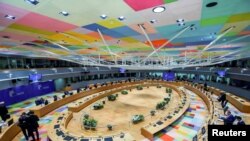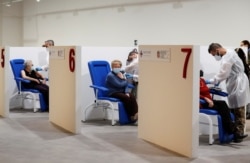The European Union pledged to deliver at least 100 million COVID-19 vaccine doses to low- and middle-income countries by year's end, and develop vaccine production capacity in poorer nations, as it wrapped up a two-day summit in Brussels.
After being criticized for a slow vaccination start, European leaders say they are steaming ahead on COVID-19 inoculations, securing 1.8 billion doses to cover the next two years — enough to export to needy countries outside the 27-member bloc. The bloc says it's also on track to surpass goals of exporting 100 million doses to developing countries.
European Commission President Ursula von der Leyen said, "We are working on an initiative to invest one billion euros from Team Europe to develop vaccine manufacturing in Africa — the capacity itself in Africa — it's a specific initiative with our African partners. An initiative not only for the production, so to build up the manufacturing capacities, but also for skills development, for the management of the supply train of, for example, the necessary regulatory framework through the African Medicines Agency."
In Europe, where many countries are emerging from lockdowns and hospitalizations are dropping, von der Leyen said the EU was on track to inoculate 70 percent of its adults by the end of July. Europe's Medicines Agency is now considering whether to approve the Pfizer-BioNTech vaccine for 12- to 15-year-olds.
Meanwhile, special COVID-19 digital travel passes aim to open up summer travel for EU citizens who are either vaccinated, immune from having contracted the virus, or have tested negative for it.
Together, says analyst Scott Marcus, a senior fellow at the Brussels-based Bruegel economic research group, the developments are shaping a more favorable tourism outlook for Europe.
"I think things are looking more promising," he said. "I still think that late summer will look better than early summer. But I think we're on track to have a summer at least as good as last summer, and probably better."
Other topics
On Monday, EU leaders announced a flight ban and other toughened sanctions against Belarus, after the forced landing of a Ryanair plane in Minsk and the arrest of a dissident journalist.
But speaking from Brussels, French President Emmanuel Macron said progressive sanctions had their limits and the EU needed to profoundly redefine its relationship with both Belarus and Russia.
Member states also discussed the thorny issue of national emissions targets to meet the bloc's overall goal of reducing greenhouse gases by 55 percent by 2030, and becoming climate neutral by 2050.

